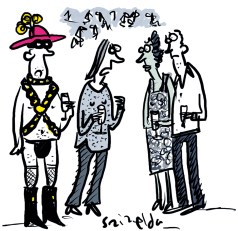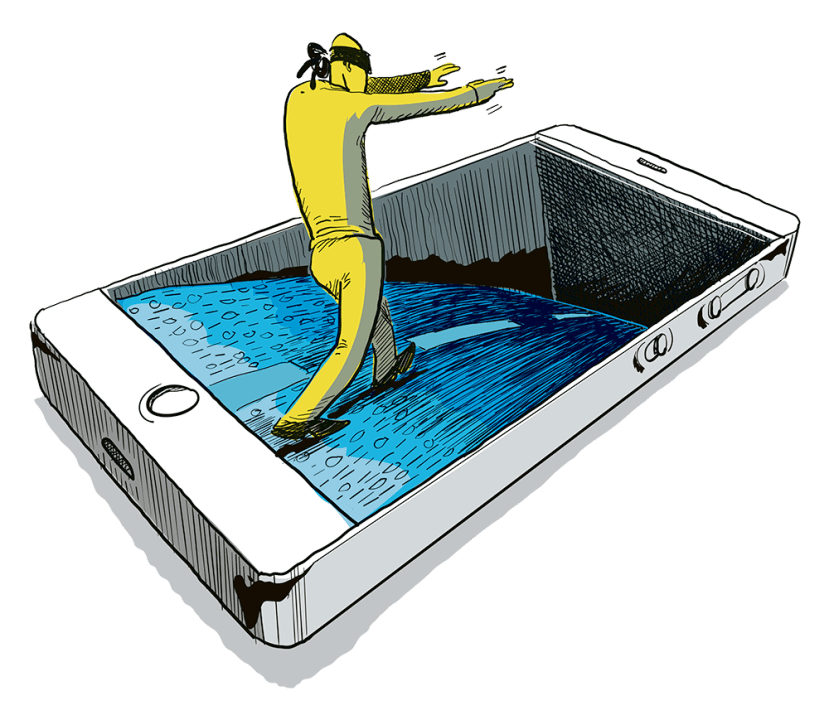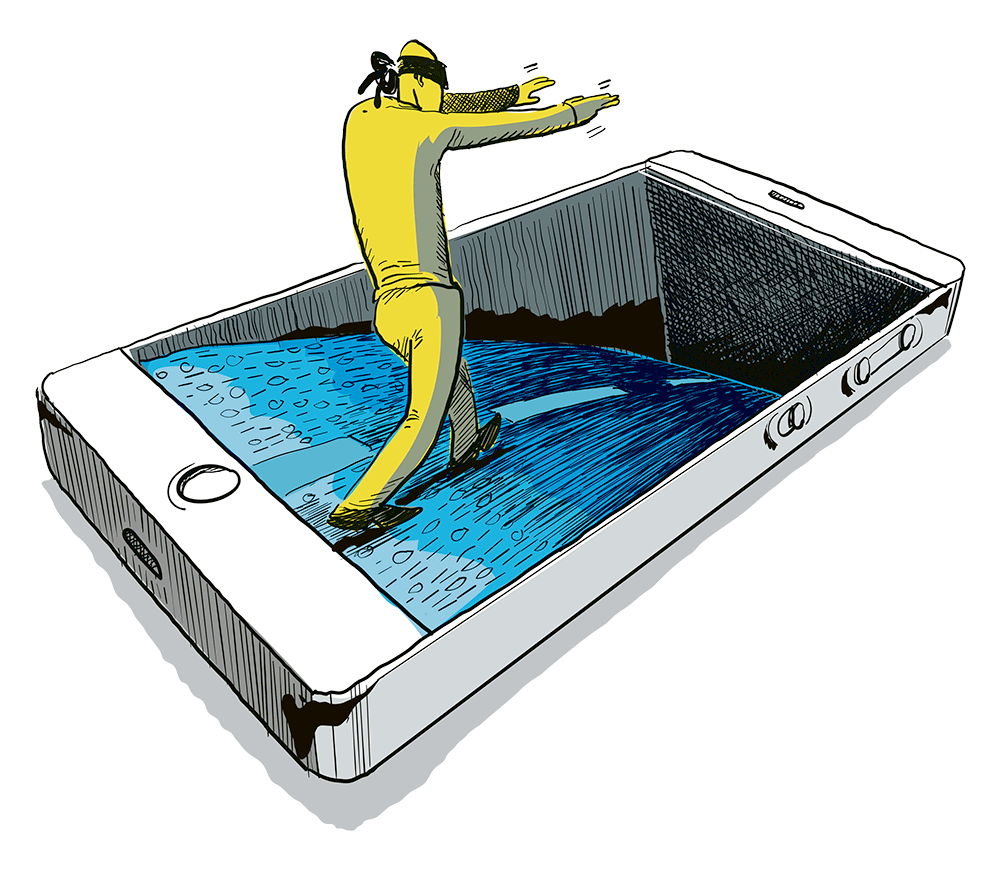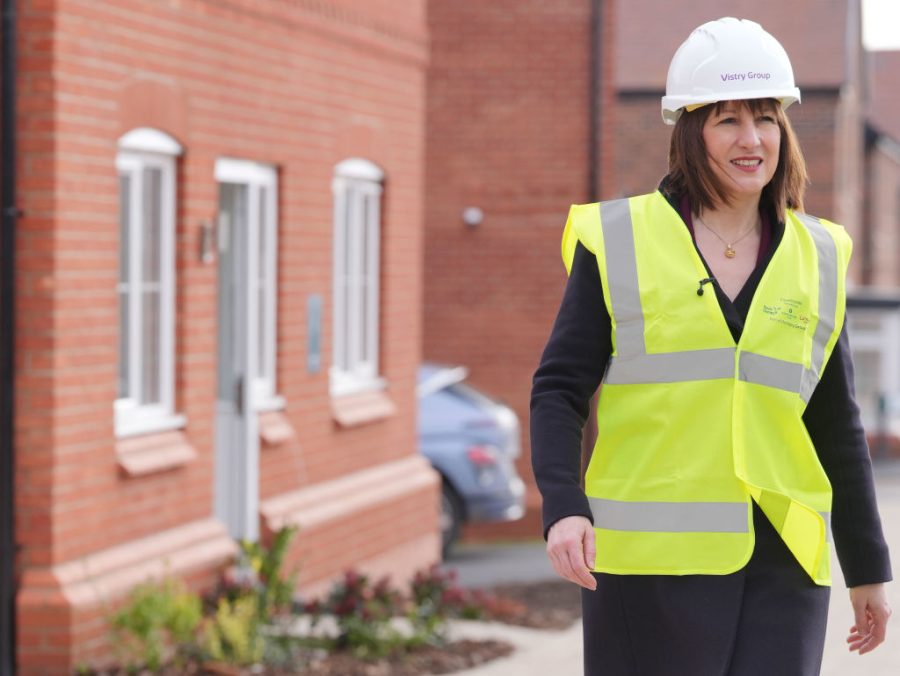
A new book by an American writer, Christine Rosen, details the way in which we are losing touch with the real world: the one we evolved in, as opposed to the virtual one. All the scrolling and texting means we’re forgetting the look and feel of life unmediated by screens. The book is called The Extinction of Experience, and if we get more anxious year by year, then it’s not just wars or the cost of living, Rosen suggests, but because we’re grieving for the real world, whether we know it or not.
I definitely know it. I’m Gen X, so I grew up without the internet, yet like other members of my generation now find myself caught in the smartphone itrap, dependent and resentful.
What happens to civilisation when we’re so deep in our separate, virtual worlds that we feel no comradeship?
It’s a proof of Rosen’s point that my friends and I increasingly find ourselves reminiscing about our pre-smartphone reality-based childhoods, like refugees remembering a country left long ago. We recall the endless waiting with no way of knowing how long the wait would be, and the various means we used to pass the endless time.
We became extremely involved with the very near environment. We examined paving stones. We peered into cracks and picked satisfying paint flakes from walls. In the car, we misted the glass with our germy breath and raced the raindrops. We chewed paper; bit our own forearms, inspecting the little dented marks; spent hours face-down on lawns, studying grass.
If you’d asked us back then, which no-body did, we’d have said we were bored to death and that the extinction of this sort of experience could only be a blessing. But we lived in constant communion not with a touchscreen but with the close-up real world, and in retrospect it was sort of wonderful.
There’s been a lot written about the disastrous effect of smartphones on our private lives, what you miss when you chat, even date, via a screen. But just as disturbing, says Rosen, is the extinction of experience from public life: the lack of acknowledgement that we’re all here in the same space. I’m a slack parent in most ways, but a fanatical enforcer of that little wave of gratitude a pedestrian gives a car which stops for them at a zebra crossing. This gesture is the bedrock of civilisation, I reckon, and there’s hell to pay when my son forgets. But it’s a dying convention. Barely one in five passers-by now gives the wave. And almost no one on the street looks at each other any more.
‘Civil inattention,’ Rosen calls it. I’ve been trying, just for fun, to make eye contact with the twentysomething baristas in the cafés round my way – the very serious purveyors of impeccable flat whites. They hate it. Their eyeballs slide sideways and widen with terror. Smartphone-induced, contact-avoidant anxiety. Or could be that they just think I’m dangerously insane?
What happens to public life, and what happens to civilisation, when we’ve sunk so deep into our separate, virtual worlds that we feel no sense of comradeship with the humans right next to us? Rosen thinks there’s a terrible price to be paid. ‘Our use of technology has fundamentally changed not just our awareness in public spaces but our sense of duty to others,’ she writes. ‘Engaged with the glowing screens in front of us rather than with the people around us, we often don’t notice what is going on.’ Worse: we don’t care.
In 2019 a man violently attacked a 78-year-old woman on the New York subway. No one intervened, but all manner of people whipped out their phones, filmed the fun event and shared it online, where it was viewed more than ten million times. ‘It was not long ago that witnessing the death by suicide of another human being would have registered as a traumatic event,’ says Rosen. ‘But now we read stories about a woman in New York who purposely used a suicidal man on the bridge as a backdrop for a selfie.’ Police in America and the UK have had to issue statements begging people who witness an assault to call for help before they start to record it.
If I could, I’d like to get a copy of Rosen’s book to Sam Altman, CEO of OpenAI, proud father to ChatGPT, and one of the leaders in the great global AI race. Last week Altman addressed the world on the subject of the coming AI apocalypse, the point at which computers overtake us in intelligence and the world is forever transformed. ‘In still very important ways, the 2030s are likely going to be wildly different from any time that has come before,’ he wrote. ‘We are building a brain for the world… We do not know how far beyond human-level intelligence we can go, but we are about to find out.’

Altman sought to reassure us normies that human life will remain sacrosanct and special, even when the virtual world dominates the real. ‘People will still love their families, express their creativity, play games and swim in lakes.’ Swim in lakes? I could spend a while pondering the insight this gives into Altman’s mind. How many people does he think live near lakes? But the most interesting part was the Panglossian conclusion: ‘There will be very hard parts like whole classes of jobs going away, but on the other hand… people have a long-term important and curious advantage over AI: we are hard-wired to care about other people and what they think and do, and we don’t care very much about machines.’
Altman stands to gain unimaginable power if his company dominates the field. He knows that the rise of AI will submerge us all even further in virtual reality and that the joyful, messy, real-life experiences we crave will be ever more elusive. I wonder if he’s considered, though, that his ‘world brain’ might spell the end of the very quality he thinks makes us most human.









Comments